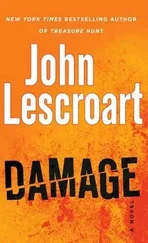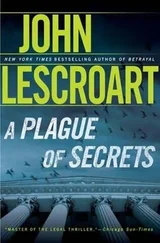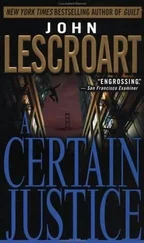Ponty squatted down and slid a card under the door, then knocked four times. The door swung open from within onto a small, closetlike enclosure. On either side of the space sat an armed guard. The room was devoid of decoration and contained only a door against the opposite wall. Ponty walked across the tiny area to that door and tried it, but it too was locked. Then he turned and walked back to us, closing the first door behind him.
“The explosives room,” he explained. “We change the guards every three hours because the anteroom is so . . . you saw it. With every shift, we change the card-and-knock sequence. I don’t mind telling you this because the guards are under orders to shoot to kill anyone who gets them to open the doors by deception. Only myself, my immediate assistant, or the guards’ replacements may be admitted into that room. Anyone else will be shot.”
I said soberly, “But you had me try the door.”
Ponty laughed. “A perfect way to eliminate my archrival, yes? But you see, you were in no danger. Only if you had had my card, knocked four times, and been admitted would you have been shot. I’m sorry if I scared you.”
I held up a hand, laughing hollowly. “I don’t scare that easily.”
He waited for a moment at the door to the explosives room. A janitor pushing a wide broom shuffled his way past us, not so much as lifting his head to acknowledge us. Ponty seemed to be observing him carefully. Clearly the presence of visitors would not be viewed as an excuse to slack off on duties.
“Friendly chap,” I ventured.
Ponty shrugged. “Nervous, I guess. Some of ’em are, here.” He sighed. “I guess it isn’t the easiest thing in the world, working inside what amounts to the biggest bomb in France.”
Georges cleared his throat, and Ponty took that as a signal to continue our tour. The next door down the hallway opened into an enormous cacophonous inferno, but Ponty had no hesitancy about gesturing us in. Four huge boilers hissed and steamed against one wall to our right, while two shovel-wielding stevedores fed coal to the burners under them. The room’s temperature was staggering.
Like a proud homeowner, Ponty walked us around. The boilers were of heavily reinforced steel, loaded with gauges that screamed under their internal pressures. Lining the back wall of the room was a small mountain of coal being slowly chipped away by the workers. Dozens of arteries—insulated piping—emanated from the heart of the arsenal’s power plant.
“What goes on here?” Georges yelled over the din.
Ponty motioned us back outside into the relative cool of the hall. He was beaming. “Impressive, isn’t it?”
“Is every room here frightening?” Georges asked.
“That frightened you?”
“It’s a vision of hell.”
Ponty chuckled. “Well, put like that, I suppose one might say it is, after all.”
“It did seem awesomely powerful.”
He nodded. “It has to be. We’ve got power needs here that I can’t discuss, but they rival those of many small towns. In effect, we’ve got our own generator. We’ve got to be able to control our power, keep it regular, allow no surges. Am I getting too technical?”
“Not at all,” Georges said.
“It’s rather fascinating,” I agreed.
We turned a corner and entered another long and narrow hall. Ponty’s words echoed off the bare walls, mingling with the memory of the other room’s straining engines. I was beginning to feel the building more as a living thing, and could understand Ponty’s nearly paternal pride in its structure as well as his fear for its safety.
“You see,” he said, “although much of the work we do here is production line stuff—making ammunition and so on—there is also a great deal of stress-related research and testing. To say nothing of the power needed to keep a place like this heated and lit over three shifts seven days a week. Those boilers never shut down.”
Georges seemed to be pondering something. “But compared to the ammunition room, they seemed poorly guarded.”
The point seemed to come home to Ponty. “You know, they may be, now that you mention it. But there is so much here that must be guarded full-time—explosives are one example; the research rooms are another—and we do only have so many men. I guess we have to draw the line somewhere.”
“It seems somehow”—Georges paused, looking for the right word—“less thorough, I suppose.”
Ponty stopped before a pair of double doors, which, we would soon discover, led to the development rooms for armored vehicles. But before we entered, he wanted to close the book on this discussion. It probably seemed to him as though we were calling his procedures into question, and he wanted to set the record straight.
“Monsieur Lavoie,” he said, “you forget that you are taking this tour with me, the director. The men shoveling coal in that room are soldiers, as are nearly all members of the staff. Perhaps you didn’t notice the weapons on their belts?”
Georges shook his head.
“Ah, just so. Anyone entering any room here without authorization does so at tremendous risk to his own life, I assure you.”
“And there are always soldiers there?”
“We can never let our power go down. I will tell you frankly, though I can’t be too specific, that certain researches we are undertaking, certain chemicals and so on, are held in an extremely precarious balance by electrical currents and constant temperatures, among other things. Slight fluctuations can be fatal. No, we take extreme care.”
“I’m sure Georges didn’t mean to imply any negligence.” I tried to calm our host.
“Certainly not,” Georges replied. “I was merely curious.”
But Ponty had one more nail to hammer home. “All our rooms are manned at all times. Even my own office, now sitting empty, is guarded. We don’t let up our vigilance, ever!”
I was glad I was with Georges, with his cosmopolitan air. He smiled suavely, including us all into his fraternity. “And we are most grateful for that vigilance, sir. The whole country is grateful.”
Ponty took obvious satisfaction in the compliment. His eyes darted quickly to me and I nodded, hoping my unspoken affirmation would lessen the sense of rivalry.
Georges continued. “The whole thing is just so amazing to me. I’ve come here so often to deliver, and I’ve seen your men loading for large deliveries. The logistics are just too awesome to comprehend. It seems as though every man in France is out there helping load munitions for the front.”
Ponty’s eyes twinkled. He was obviously somewhat taken with Georges. Often in my career and in my life, I’d noticed that once a person has tapped one emotion in another, a door may be opened to other emotions. Georges had angered Ponty, and the director’s response had compromised his natural reserve and professional manner. Once Georges had cooled his anger, the door was open to friendship. We were all, suddenly, members of the same club—men of similar natures caught up in the most serious of endeavors, unable to trust or love or find release from the unbearable tensions of the times.
Ponty smiled warmly now. “I’ll let you both in on something, then, since you’ve been so astute. When we have heavy shipments, everyone helps, even myself. For fifteen, perhaps twenty minutes, we are all pack mules. Except, of course, for the guards at the explosives rooms. They never, ever leave their posts.”
Georges returned Ponty’s smile. “Your secret is safe with us, eh, Jules?”
“To our graves,” I responded.
“And now,” Ponty said, opening the double doors, “let me show you . . .”
Our tour continued for the next hour or so. None of the other rooms, it turned out, was as closely guarded as the explosives room, though security everywhere was tight.
Читать дальше












